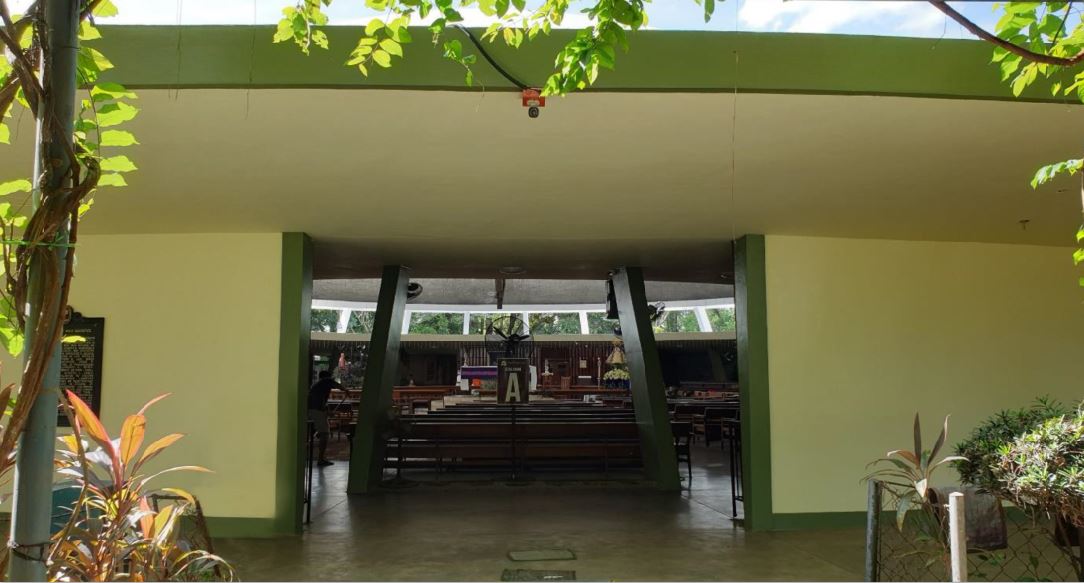I was Praying with my Fellow UPSCANS that Day: The Miracle of Prayers
https://theintellectualmigrants.blogspot.com/2019/04/my-undergraduate-college-years-in-up.html

·

The above chapel is known for its architectural design, and the church is recognized as a National Historical Landmark and a Cultural Treasure by the National Historical Commission of the Philippines, and the National Museum of the Philippines respectively. It was designed by the late National Artist of the Philippines for Architecture, Leandro Locsin, one of four National Artists who collaborated on the project. According to a post from the UP Diliman website, it is the only structure in the country where the works of five national artists can be found. Alfredo Juinio served as the structural engineer for the project.
***************************************************************************
"Yes, go ahead. You do the pouring. I will do the praying."
The chapel features the Philippines' first thin-shell concrete dome, designed by structural engineer Alfredo L. Juinio. Engr. Consunji, founder of the DMCI Group of Companies, pioneered the techniques required to mix and deliver the 3,000 psi concrete needed to build the structure.
In his memoir “A Passion to Build,” Engr. Consunji shares the memorable moments leading up to the dome’s construction and his important conversation with Fr. John P. Delaney, S.J., the first chaplain of the UP Diliman Catholic community and the guiding hand behind the chapel's creation:
"Work on the chapel began in May 1955. By July, we had begun work on the dome. We made the form, laid the steel bars, and built the scaffolding and the runway. Then we had a dry run of the pouring system until we were confident we could do it perfectly.
The crucial part about this was that the concrete on the dome had to be poured continuously: that was non-negotiable. I estimated the job would take not less than 18 hours. So the weather had better cooperate with us. By then it was August 1955, already well into the rainy season and always a stormy month.
The day before the scheduled concrete pouring, I told Fr. Delaney we were ready to pour except that it looked like it was going to be stormy. We could not risk being rained on because too much water would ruin the concrete. He said: “Just come here early in the morning and we'll see what the weather will be like.”

I clearly remember that day, the 25th of August, 1955. I woke up at 4 o’clock in the morning. It had started to rain and I could see the beginning of a storm. When I arrived in UP, the rain and the wind had started to come in as well.
I went straight to the chapel. Fr. Delaney was preparing for the 5 a.m. Mass. I asked him if we should proceed in spite of the weather. He said, “Yes, go ahead. You do the pouring. I will do the praying.”
I could do nothing but obey. With a heavy heart. I went to see my workers, who were all ready to go home. To their surprise, I said: 'We will do the pouring today, so let's start."
At 5 o’clock, everything was set. The concrete mixers were humming and the workers were ready to pour concrete around the base of the roof. I looked up once more and saw the dark skies. There were rain showers all around the UP campus-but not on the site itself. It didn't look good to me, but I gave the go-ahead just the same.
We started pouring. After an hour, the weather turned for the worse. The entire morning, we saw UP students running from building to building drenched, their umbrellas blown all over by the strong wind. It seemed to us that the entire campus was experiencing a storm. But, miracle of miracles, not a single drop of rain fell on the spot where we were working! The entire jobsite was dry.
I went to the old chapel to see Fr. Delaney and have breakfast. There I saw many students, all members of the UPSCA (UP Student Catholic Action), praying in relays. They were storming the heavens with prayers! No wonder the storm never hit the jobsite.
The above three photos are some of the UPSCANs that were involved with Prayer Relay at the old Chapel that Day, August 25, 1955. I am proud to participate at the Prayer Relay that Day.
Three hours into the work, the entire periphery of the dome, about a meter high, was concreted. It was going to be a lot easier from then on. My workers stopped worrying about the rain and just kept working on and on, moving the buggies around on the runway, loading, pouring until at last, the entire dome was covered.
It was already 11 o’clock in the evening when the last buggy of concrete was emptied, 18 hours since we started. In the next hour, we did the finishing touches — smoothening out the rough edges, making sure the contour of the dome was perfect. At 12 midnight, a rain shower began to fall on the dome, as if on cue, curing the concrete in the process. By then, all our anxieties had vanished. The dome had been built.”
From: David Consunji Book of Memoirs, The Passion to Build
Last but Not Least:







No comments:
Post a Comment